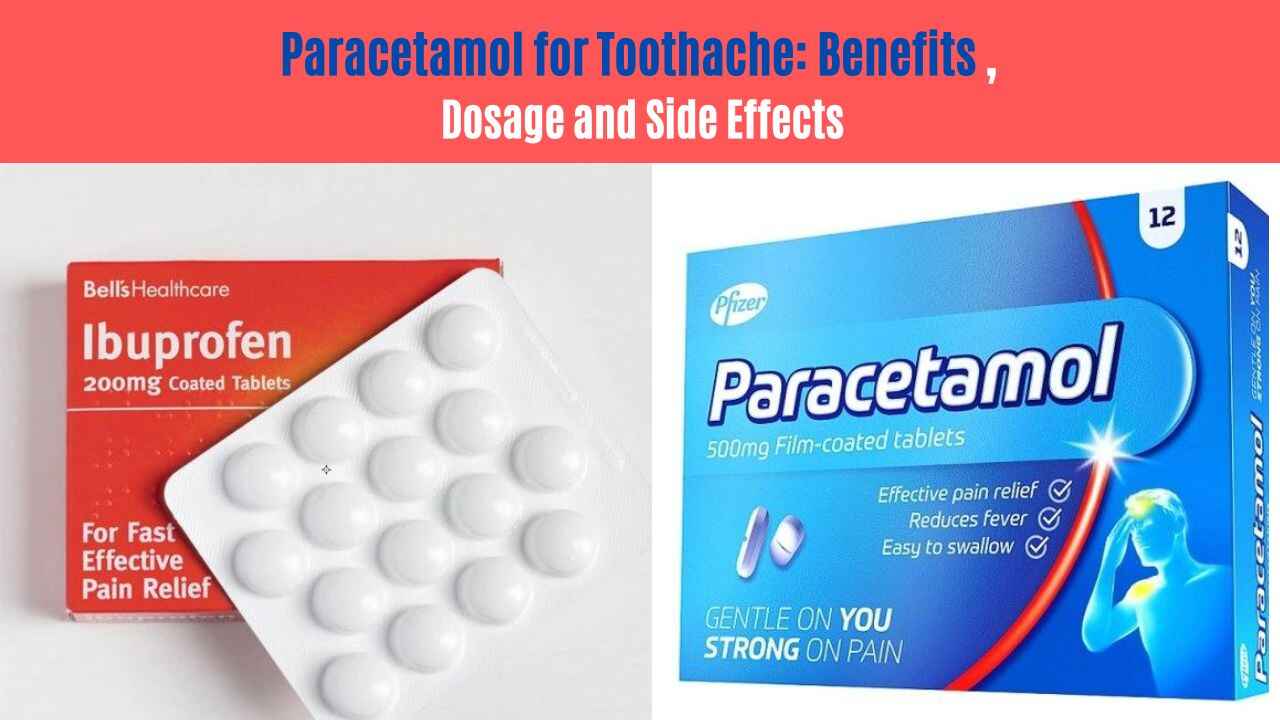Toothache is one of the most prevalent complaints among patients, and it’s not uncommon for people to seek relief from over-the-counter (OTC) drugs. While paracetamol is a typical over-the-counter pain treatment, there is a lot you should know about it before using it to treat toothache. This article will go over everything about paracetamol for toothache. We hope this information helps you make a better-educated decision about using this medicine to treat your toothache. So, let us begin by knowing its advantages, price, dosage, usage, and adverse effects.

Paracetamol for Toothache
Paracetamol is an excellent choice for an effective and safe pain reliever. It is available over the counter and is simple to use; pop it into your mouth and drink it with water. Paracetamol is an NSAID, which means it acts by lowering inflammation. Therefore, it’s frequently used to treat headaches, muscular pains, and toothaches. When it comes to toothache, paracetamol is extremely beneficial since it not only relieves the pain but also helps to cure the underlying cause of the discomfort, which is dental tissue swelling. This implies that you will not only be able to ease your toothache momentarily, but you will also prevent it from recurring in the future.
To use paracetamol for toothache, take the recommended amount from your doctor or health expert. Drink lots of water when taking it to avoid unpleasant side effects such as tiredness or nausea. If all else fails, consult a dentist as soon as possible!
Benefits of Paracetamol for Toothache
If you have a toothache, there is a strong probability that paracetamol can assist. Paracetamol relieves the inflammation and discomfort associated with dental issues. There are several advantages of utilizing paracetamol for toothache.
- First and foremost, it is an excellent pain reliever. It also has anti-spasmodic qualities, which means it aids in reducing muscular spasms that may be causing a toothache.
- Furthermore, it minimizes the amount of swelling and discomfort in the region around the tooth, making treatment simpler.
- Finally, paracetamol is an analgesic, which means it alleviates subjective pain feelings. This makes it an excellent option for patients who find traditional pain relievers ineffective or uncomfortable.
Paracetamol for Toothache Dosage
Take paracetamol for toothache with or without meals. Adults should consume one or two 500mg pills up to four times daily. Provide a minimum of 4 hours between dosages.
Overdosing can have significant consequences. If the pain is severe, resist the urge to raise the amount or consume a double dose. Adults can consume up to four doses in 24 hours. Give yourself around four hours of gap between every dose.
How to use Paracetamol for Toothache?
If you have tooth pain, there are a few things you may do to alleviate it. One alternative is to take paracetamol, an over-the-counter (OTC) drug. So, if you are having trouble dealing with your toothache, a couple of dosages of paracetamol may assist relieve the pain and reduce swelling. Always check your doctor before using any over-the-counter drugs since they might harm certain people’s health. Also, always read the label carefully to determine how much paracetamol for toothache to consume and for how long.
Paracetamol for Toothache Price
Paracetamol is one of several generic and over-the-counter pain relievers that may be used for toothache. The cost of paracetamol for toothache varies based on the dosage and brand name, but it is typically inexpensive. Several Paracetamol formulations are available, with prices varying according to potency and dose. Paracetamol for toothache has an MRP of Rs. 14.60. However, when purchased over the counter, it normally costs between Rs. 11 to Rs. 14.
Paracetamol for Toothache During Pregnancy

There are a few things you should know about paracetamol during pregnancy. First, it is crucial to remember that paracetamol is a common pain reliever used to treat various issues, including toothache. However, as with any drug, use caution during pregnancy because there is still some question about its safety. While there is no proof that paracetamol for toothache causes birth abnormalities or other serious issues in pregnant women, it is always better to see your doctor before using any pain relievers.
Another thing to remember is that pregnant women should not take more paracetamol for toothache than is prescribed. Taking too much medicine can cause severe sleepiness or drowsiness in pregnant women. So, take the maximum amount required for the relief you are looking for, and avoid taking it if you are already tired or lightheaded.
Risk Factors
While using paracetamol for toothache, you should be aware of a few risk concerns. These are some examples:
- Using beyond the recommended dosage
- Failing to take the medication as advised by a doctor
- Using other medications that interact with paracetamol
- Not drinking enough water when using paracetamol
- Taking other pain relievers, such as ibuprofen or codeine, at the same time
- An overdose might result in significant negative effects, such as liver damage and renal failure.
Paracetamol for Toothache Side Effects
If used at the recommended dosage, paracetamol for toothache produces negative effects. Consult your dentist or pharmacist if you are concerned about any side effects or observe anything out of the ordinary.
- Nausea Or Vomiting
- Allergic Skin Reaction
- Gastric / Mouth Ulcer
- Anemia
- Fatigue
- Loss of appetite
- Sweating
- Abdominal pain
- Extreme tiredness
- Yellowing eyes/skin
- Dark urine
- Stevens-Johnson Syndrome (Sjs)
When to see a dentist?
If you get a toothache, you should see a dentist as soon as possible. This is because inflamed and infected teeth might lead to more significant problems later. Furthermore, if your oral health isn’t excellent enough for frequent dental check-ups, this might indicate that you need extra dental treatment done sooner rather than later.
If you experience significant pain or infection in your teeth, you should see a doctor right away so that they can assess and treat the condition. Furthermore, if you are using paracetamol for toothache and experience any side effects, you should contact your dentist as soon as possible.
Conclusion
You now understand everything there is to know about paracetamol for toothache. Here is all you need to know about this potent analgesic. Paracetamol for toothache can make your life simpler, whether you use it for little discomfort or a serious ailment. Just make sure you utilize it correctly and never skip a dose. It is both safe and efficient in the treatment of toothaches. It should never, however, be used in place of normal dental exams and visits to the dentist. Also, contact your dentist immediately if you have any negative effects while taking this medication.
You May Also Like
| How to Remove Tartar from Teeth? | What are Removal Braces (Aligners)? |
| Ketorol DT for Toothache: Uses, Benefits, Dosage, and Price | Diastema: Causes,Symptoms and Treatments |
Frequently Asked Question For Paracetamol for Toothache
Since everyone’s pain tolerance for paracetamol differs, there is no definitive answer. Paracetamol for toothache is available over the counter in a variety of strengths. Adults, on the other hand, should take one or two 500mg pills up to four times each day. Give yourself at least 4 hours gap between each dosage
Several pain medications on the market can be beneficial for dental pain. Ibuprofen, acetaminophen, and aspirin are some choices. These medicines reduce the quantity of histamine in the body, which creates tooth pain feelings. Ibuprofen is usually best for mild to moderate toothaches, although Tylenol and Acetaminophen may be better for severe or persistent instances.
Several forms of paracetamol are available, which should be beneficial for treating various symptoms, including toothaches. Ibuprofen (Advil), naproxen sodium (Aleve), and acetaminophen (Tylenol) are a few examples.
If you have a toothache, the quickest approach to relieve it is to use a cold compress. Wet a handkerchief and place it over your face and mouth with ice on top to make this. Repeat this method until the pain is gone.
Sleeping with a toothache can be difficult and inconvenient, but there are several things you can do to make it as painless as possible. The easiest method to sleep with a toothache is to take painkillers like aspirin or ibuprofen before bed. This may also help to relieve some of the pain.
It might require up to an hour for paracetamol to take effect. It continues to function for around 5 hours.
The type of medication required to manage your pain is determined by the kind of pain you are experiencing.
If you get a toothache that lasts longer than a day or two, see your dentist as quickly as possible to have it addressed. The longer you wait, the worse it will get. If you do not treat your toothache, the pulp within your tooth can ultimately get infected.


